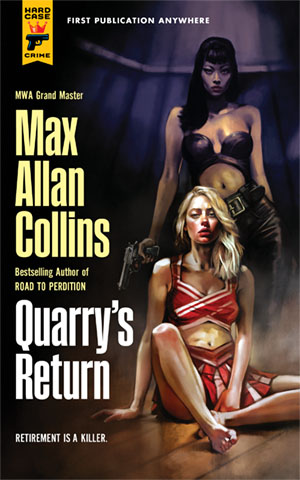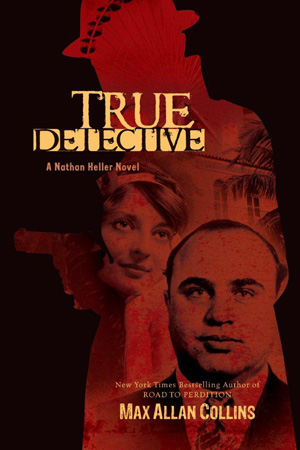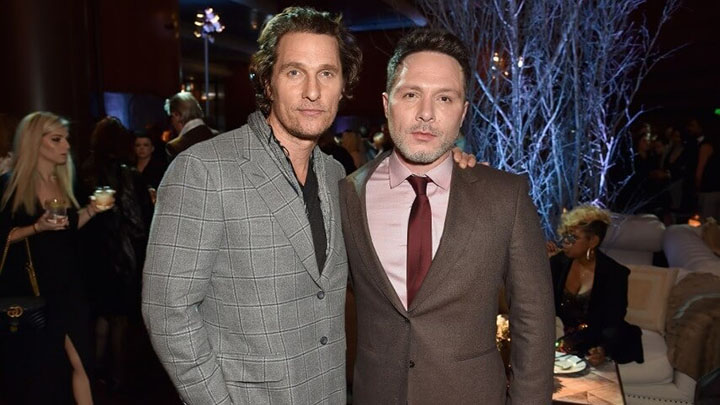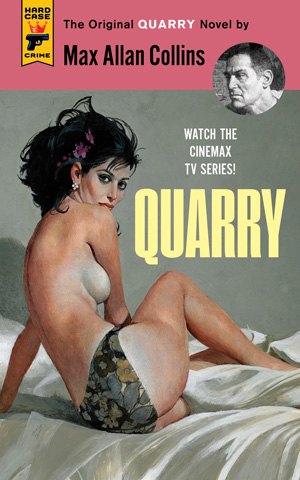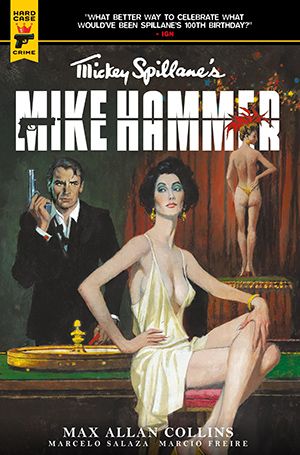It’s book giveaway time, with the new trade paperback edition from Hard Case Crime of The Last Quarry on offer to the first ten of you who ask for it.
As usual, if you’re interested, you write me directly at macphilms@hotmail.com. If you receive a copy, you agree to write a review at Amazon and/or Barnes & Noble, and/or your own (or someone else’s) blog. If you hate the book, you’re relieved of this obligation. Mixed reviews are fine, and only mildly resented. USA only, due to postal restrictions. Be sure to include your snail-mail address.
This trade paperback includes two of the four Quarry short stories as in-the-back-of-the-book bonuses: “Guest Services” and “Quarry’s Luck.” The other two short stories, “A Matter of Principal” and the fourth (the name of which escapes me – it appeared in The Strand) [“Quarry’s Gamble”, The Strand #52 — Nate] were swallowed up in the novels for use in The Last Quarry and Quarry’s Climax respectively.
The cover of this new book is particularly handsome. It’s by the great Robert McGinnis, one of the premiere paperback cover artists of the golden age of noir paperback originals and the guy who did some of the most iconic James Bond movie posters. I’ve told the story frequently, but I’ll go into it briefly here for you newer comers.
When Charles Ardai started up Hard Case Crime, I was one of the authors he approached (most of the others were dead, so it was their estates Charles approached). He did a reprint (in one volume) of the first two Nolan novels (Bait Money and Blood Money) called Two for the Money. He came back for more reprints and I said I’d rather do an original, even if it was just for reprint-level money. I believe he at first wanted a new Nolan, but I preferred doing a Quarry, the character having always been one of my favorites, and the series one I thought should have lasted and received more recognition.
The final negotiating point between Charles and me was my saying essentially, “I’ll do the novel if you get me a McGinnis cover.” And I’ll be damned if he didn’t.
At this point I’d written one more Quarry novel (Primary Target, aka Quarry’s Vote) in the wake of the initial Nate Heller success, and a nifty little Quarry short film that was burning up the festival circuit. I used that film in an anthology of my other short films as well as the Spillane documentary; this was called Shades of Noir, and the original paperback of The Last Quarry was sort of the movie tie-in to that boxed set of DVD’s.
Quarry was inspired by three things – well, two people and one thing. The thing was the Parker series by Richard Stark (Donald E. Westlake) that I loved then and love now; and Nolan was my direct take on Parker, humanizing him with a young sidekick. But I always thought there was a cop-out nature to that series, and my own – Parker was a thief and when he was forced to kill somebody, that somebody was another bad guy. Same was pretty much true of Nolan. It occurred to me nobody had really done this kind of novel – a “crook book” where the heroic protagonist (okay, anti-heroic) was a hitman. I wanted the reader to have to deal with the point of view character being, unapologetically, a hired killer.
I did not have a series in mind but did leave the door open for a follow-up novel or two. (Nolan had not been conceived as a series either, and even died in the original draft of Bait Money.)
The two people impacting the creation of Quarry were Audie Murphy, the most decorated soldier in the European Theater in World War Two, and later a movie star, mostly in westerns. I’d read enough about him to know he had been traumatized – had PTSD, though nobody was calling it that yet – which I found interesting. A normal kid who became a cold-blooded killer (of the enemy, but that counts).
The other inspiration was Jon McRae, a high school pal of mine who went on to several very bloody tours in Vietnam. Unlike some friends of mine, he came home recognizably his eccentric self, but he was nonetheless clearly traumatized by what were then still ongoing experiences. To give you the idea, he was the machine gunner in the tail of a rescue ‘copter.
Stir my Mickey Spillane obsession into the mix, and my admiration for “Richard Stark,” and you have Quarry. I was approached by Berkley Books to do three more novels about him and snapped up the chance. The subsequent three novels were increasingly violent and black humor-tinged. I was, frankly, worried about the direction they were taking – not the four books I’d done, but what the fifth book might be, and any future ones. I feared I’d gone down a road of having to top myself with some terrible thing Quarry did toward the end of a given novel – the basic idea having been to lure the reader into accepting Quarry as a narrator and even identifying with him, then getting slammed with something awful he does, and making readers question their own ease in going along with Quarry, to accept him as a “hero.”
That became no problem when Berkley Books asked for no further Quarry entries.
Over the years, however, I had more mail about Quarry than any other character of mine (pre-Heller). That, and my feeling that Quarry was an original creation, served poorly by the original publisher, made the series an itch that called out for scratching.
So when Charles gave me the opportunity to write The Last Quarry, an opportunity to answer whatever-happened-to-Quarry and wrap up the series, I grabbed it. When the book became a surprise success, both in terms of sales and reviews, this old war horse didn’t have to hear the bell ring twice. I was off and running with The First Quarry and my series of novels about the missing years in the character’s life between already written books.
Series have a way of knowing when they are either over or evolving, and Quarry is no exception. Almost from the start, the concept of Quarry evolved into him using the list of his dead Broker (murdered by Quarry) to approach targeted victims and taking out assassins…a kind of prolonged metaphorical self-suicide…which eclipsed the hitman aspect. Some of the flashback books depict Quarry in his hitman years, but the initial novel (The Broker aka Quarry) is essentially his last job before his transition to the “list” approach.
Killing Quarry emerged from somewhere in my subconscious to conclude the “list” cycle. The next book, Quarry’s Blood, in part returned to hitman days and then mostly was about Quarry at a much older age – essentially mine, maybe a couple of years younger – and I found that interesting enough to pick that up again in the more recent Quarry’s Return.
Now I will soon be embarking on Quarry’s Reunion, which will almost certainly be another of the Quarry-in-old-age novels. I had promised a while back that any further novels would revert to the “list” days, most likely; but if you’re expecting consistency from me, it’s only to be found in my ability to write readable books.
I realize much of what I’ve just shared is already known to some of you – maybe many of you – but it seemed like returning to the evolution of this series was appropriate with a Last Quarry book giveaway.
Here’s another story you may have already heard from me. I was so thrilled with McGinnis cover to The Last Quarry that I coaxed the artist’s phone number out of Hard Case Crime editor Charles Ardai. I called Bob McGinnis and told him what a career high it was for me to have a cover by him on a novel of mine. I was undoubtedly effusive and he took my fannish enthusiasm with grace. Then he asked me if I’d like the original art of the cover. That threw me, because I was next expecting him to offer it to me at a price I could not afford.
But I could afford it, all right. All he wanted was my address to send me the art.
It hangs near my desk now, an incredible reminder of how lucky I’ve been to have this career of mine, getting everything I ever wanted out of it (except getting rich). I have four other original covers from Quarry novels on my walls, by various artists, and all of those I did find a way to buy. One I particularly like, The Wrong Quarry painted by Tyler Jacobson, hangs near my desk, as well. Not all the covers (and I like them all) for Quarry novels have depicted him. But the ones that do that also match the image in my mind’s eye are the McGinnis and Jacobson ones.
When I’m asked who my favorite is among the heroes (and heroines) of my various book and comics series, it always comes down to Quarry and Nate Heller. Don’t ask me to choose between them, because they are both me.
* * *
Here is a particularly good YouTube video about the film version of Road to Perdition, provided to me by Terry Beatty himself.
* * *
Here is info and pre-ordering for Law and Order, the 1932 Wyatt Earp movie starring Walter Huston and Harry Carey derived from the hard-to-find 1930 W.R. Burnett novel. This has the commentary by me and the great Heath Holland of Cereal at Midnight, a recording I mentioned last week that I was about to do.
It’s a terrific movie. Don’t miss it.
* * *
I also teased last week about working on a screenplay. I can’t (or anyway won’t) give any details, but I’ve just completed my first Nathan Heller feature film screenplay, which will tie in with True Noir, the ten-episode audio adaptation of True Detective written by me and directed by Robert Meyer Burnett. The producers include Mike Bawden, Phil Dingeldein and Christine Sheaks.
This screenplay is not an adaptation of True Detective, however – it’s from another published work in the series. It’s a speculative effort but one that I think has a good shot at paying off. The only previous Heller screenplay I wrote was the pilot episode for FX of a Stolen Away mini-series that never happened (I did, however, get paid).
Speaking of True Noir, the last two episodes will be dropping soon. Then you can order it all at once. The almost five-hour production, starring Michael Rosenbaum as Nate Heller, will eventually be available on Blu-ray. A Blu-ray of an audio? Yes! This production with its incredible cast (https://www.imdb.com/title/tt32507868/) will be on a disc that will also have all ten episodes of my History Behind the Mystery series (one per episode of the audio production) and a lengthy interview with me by Rob Burnett. A book of my ten scripts will also be available around the same time.
If this audio production is successful, our next productions of True Noir movies-for-the-mind will be the other two books in the Frank Nitti Trilogy, True Crime and The Million-Dollar Wound.
You can help make that happen, if you haven’t already, by going to truenoir.co and buying the entire ten-episode series for a modest $29.95.
Eventually there will be a soundtrack CD available of the excellent Alexander Bornstein score.
* * *
You may have already seen this nice little article about Ms. Tree, but it’s worth another look, anyway, particularly in the wake of the recent publication of the sixth and final volume of the archival series from Titan, Ms. Tree: Fallen Tree.
* * *
The Quarry movie, The Last Lullaby, is available on YouTube now. Tom Sizemore is “Price” (aka Quarry). I wrote the first drafts of the script and did a final punch-up, but another writer wrote a draft, too…so it’s not pure Quarry, but it’s pretty good.
M.A.C.
